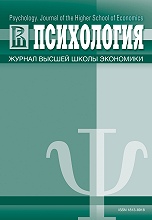Expression of Private Experiences and Structure of Psyche
Abstract
The article presents a theme of reconstruction of the polemic between analytic philosophers and psychologists concerning the relations of thought, language and speech in expression of private experiences. The method of comparative analysis helped the author to elaborate L. Wittgenstein’s argument for reduction of cogitative operations to language, and language to logical propositions. Expression of individual experiences becomes aRb justified because of their transfer to forms of attributive kind. This procedure complicated the congruence of form and content of private experiences in speech. The alternative point of view presented by psychological ideas by J. Piaget and L. Vygotsky, as well as their contemporary expounders, provides the extended interpretation of mind considering its development across the lifespan. Types of speech, namely the external speech and the inner speech, were distinguished. The external speech showed the direct link with thought and logical forms of language to express private experiences. The inner speech disclosed opportunities to express private experiences via connection of thought with language mediated by imagination. In social-cultural regard, the inner speech becomes the channel for translation of private experiences by imposing impulses created by the person on performative forms of the statement (were disclosed in the Theory of Speech Acts by J. Austin). The novelty of the research is contained in the introduction of the modern forms of Unity-Variety dialectics, correlated to the polemic on the nature of human mind and channels for translation of private experiences. In psychology, the result opens prospects to analysis of mind structures, which mediate thought and language in expression of private experiences.
Downloads
References
2. Austin, J. L. (1962). How to do things with words. Cambridge, MA: Harvard University Press.
3. Baddeley, A. D., & Lewis, V. (1981). Inner active processing in reading: The inner voice, the inner ear, and the inner eye. In A. M. Lesgold & C. A. Perfetti (Eds.), Interactive processes in reading (pp. 107-129). Hillsdale, NJ: Lawrence Erlbaum.
4. Ciarrochi, J., Kashdan, T. B., & Harris, R. (2013). The foundations of flourishing. In T. B. Kashdan & J. Ciarrochi (Eds.),Mindfulness, acceptance, and positive psychology: The seven foundations of wellBeing(pp. 1-29). Oakland, CA: Context Press.
5. Coltheart, V. (1999). Phonological codes in reading comprehension, short-term memory, and memory for rapid visual sequences. In V. Coltheart (Ed.), Fleeting memories cognition of brief visual stimuli (pp. 181-225). Cambridge, MA: The MIT Press.
6. Davidson, D. (1963). Actions, reasons and causes. Journal of Philosophy, 60, 685-700. https://doi.org/10.1093/0199246270.001.0001
7. De Guerrero, M. C. M. (1999). Inner speech as mental rehearsal: The case of advanced L2 learners. Issues in Applied Linguistics, 10(1), 27-55.
8. Ehrich, J. F. (2006). Vygotskian inner speech and the reading process. Australian Journal of Educational and Developmental Psychology, 6(3), 12-25.
9. Fenk, A. (2013). The cognitive functions of inner speech. In D. Moyal-Sharrock, V. A. Munz, & A. Coliva (Eds.), Mind, language and action. Papers of the 36 th International Wittgenstein Symposium, August 11-17, Kirchberg am Wechsel (pp. 128-130). Kirchberg am Wechsel: The Austrian Ludwig Wittgenstein Society.
10. Grice, H. P. (1996). Meaning. In A. P. Martinich (Ed.), The philosophy of language(3rd ed.) (pp. 85-91). New York: Oxford University Press.
11. Jones, P. E. (2009). From “external speech” to “inner speech” in Vygotsky: A critical appraisal and fresh perspectives. Language and Communication, 29, 166-181. https://doi.org/10.1016/j.langcom.2008.12.003
12. Kissine, M. (2008). “Locutionary, Illocutionary, Perlocutionary”. Language and Linguistics Compass, 2(6), 1189-1202. https://doi.org/10.1111/j.1749-818x.2008.00093.x
13. Piaget, J. (1998). The language and thought of the child(4th ed.). London: Routledge.
14. Pilotta, J. J., & Mickunas, A. (1990). Science of communication: Its phenomenological foundation. Hillsdale, NJ: Lawrence Belbaum Associates.
15. Searle, J. R. (2002). Individual intentionality and social phenomena in the theory of speech acts. In J.R.Searle, Consciousness and language(pp. 142-155). Cambridge, MA: Cambridge University Press.
16. Smith, L. (2009). Wittgenstein’s rule-following paradox: How to resolve it with lessons for psychology. New Ideas in Psychology, 27(2), 228-242. https://doi.org/10.1016/j.newideapsych.2008.04.006
17. Strawson, P. F. (1964). Intention and convention in speech acts. Philosophical Review, 73, 439-460. https://doi.org/10.2307/2183301
18. Vygotsky, L. S. (1986). Thought and language. Cambridge, MA: MIT Press.
19. Wittgenstein, L. (1922). Tractatus Logico-Philosophicus. London: Routledge & Kegan Paul.
20. Wittgenstein, L. (1968). Philosophical Investigations(G. E. M. Anscombe, Trans.) (3rd ed.). New York: Macmillan.





